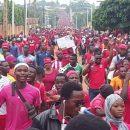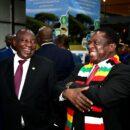Tamazuj in Kadugli
Over the last two days, leaders of the Government of National Unity have been meeting in Kadugli under the banner “First Reflections Forum for Tamazuj States.” Tamazuj is officially translated as “intermingling” but there is no consensus on the exact meaning of the term. In any case, the “Tamazuj states” are the ten states on either side of the internal north-south boundary, plus Abyei district. And whereas official slogans up to now have stressed the aim of “Peace, Unity and Development,” we now see “Peace, Tamazuj and Development.”
This conference should really have happened in the early stages of the CPA. Its focus is on what can be done to bring the people of these states together, building contacts across the north-south boundary and finding means of settling disputes that may arise–the practical agenda of “making unity attractive” that has not got the attention it warranted. The forum heard about efforts for building roads, rehabilitating the railway, expanding electricity, developing agriculture and veterinary services, establishing inter-tribal conferences, and a host of other mechanisms. These will be necessary whether Sudan remains as one country or becomes two.
It is appropriate that the meeting was held in Kadugli, capital of South Kordofan State, because in the last ten months that state has made impressive progress in terms of building infrastructure and settling disputes among the communities. These efforts began late but they are accelerating. This culminated in last week’s decision to remedy the defects of the census in the state — that arose when the SPLM instructed its members to boycott the enumeration in 2008 — by holding a new census. South Kordofan will elect state representatives and a new governor only when that has been done and new constituencies have been demarcated. In the meantime, South Kordofan will send an additional four members to the National Assembly after the upcoming election, to compensate for the missing voters. The governor of South Kordofan, Ahmad Haroun, and his deputy, Abdel Aziz al Hilu, have established an excellent track record of cooperation and problem solving.
Concerns over the implications of the border for the local people are becoming clear. On the northern side, there are worries that when the border is demarcated, some communities will be divided, or cut off from their dry season pastures. On the southern side, concern was expressed that disarmament has proceeded faster in the southern states than in the northern ones, so that northern pastoralists will cross well-armed into the south, facing southern communities that are no longer armed.
It’s not clear what shape the concept of tamazuj will take. It could become a charter for peaceful coexistence and maintaining ties among peoples. If it is to fulfill this potential, tamajuz will need a great deal of effort over the coming months.
It was a pleasure to see Kadugli, looking quiet and prosperous. The last time I saw the town was from a distance, fifteen years ago, when the SPLA held the hills and the front lines divided them from the city. Things have improved.







Dear Alex,
I agree with you that this and any other such gatherings should have started in earlier stages of the CPA, however it is good that it took place. We should also take into account that there were many implications for the CPA, that needed implementation, problems that developed, disagreements that froze all actions, however I tend to think that there is some realization developing in the Sudan,that the country is facing the most decisive moment in it’s history. Under different circumstances and leaders the transitional period could have been reviewed,unfortunately we no more have a John Garang.
It’s very nice to read these sort of articles. It’s a very good reprieve from the usual Khartoum versus World chatter. Many thanks.